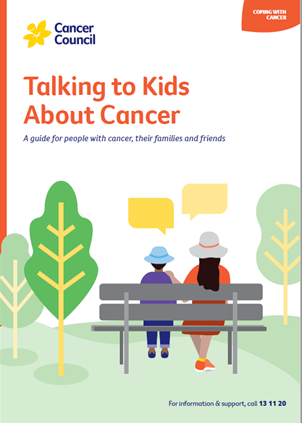- Home
- About Cancer
- Family and friends
- Talking to kids about cancer
- Talking about treatment
- Family life during treatment
- Encouraging children to help
Encouraging children to help
When a family is dealing with a cancer diagnosis, children may need to take on extra responsibilities. If children feel they are being useful at this time, it can boost their self-esteem because it shows that you value and need them.
| Simple tasks for younger children | Young children can help with simple tasks. |
| Engaging older children and teenagers | With older children and teenagers, it’s reasonable to want them to help more around the house, but it’s important to talk to them first. |
| Balancing responsibilities and fairness | Try to avoid overloading teenagers with household chores and try to share tasks fairly among all family members. Jobs that need to be done are not always obvious to older children, so discuss priorities and how tasks can be divided up. See below for a range of age-appropriate ways that children and teenagers can help. |
| Letting teenagers spend time with their friends | When asking teenagers to help with household chores, keep in mind that it is age-appropriate for them to spend time with their friends as well. Missing the opportunity to socialise with their peers can make them feel resentful at a difficult time and affect their self-esteem. It may also cause them to be socially isolated from friendship groups. |
Helping around the house
The internet is a good source of information about appropriate jobs around the house for children of all ages.
Try searching for “age-appropriate chores”. Some possibilities include:
Ages 2-4
| |
Ages 4-8
| |
Ages 8-12
| |
Over 12
|
Reflect on what’s important
This can be a time to reflect on priorities and what really matters for your family. You might choose to let go of some household tasks that you previously thought were essential.
For more information about all aspects of cancer, listen to our podcast series, The Thing About Cancer and to the episode below.
→ READ MORE: Single-parent families
Podcast: How to Help Someone with Cancer
Listen to more of our podcast for people affected by cancer
More resources
Prof Jane Turner AM, International Psycho-Oncology Society President Emeritus,The University of Queensland, QLD; Taylor Baker, Consumer; Dr Ben Britton, Principal Clinical and Health Psychologist, Head of Psychology, Hunter New England Mental Health, NSW; Camp Quality; Dr Lisa Cuddeford, Head of Department, WA Paediatric Palliative Care Service, Perth Children’s Hospital, WA; A/Prof Peter Downie, Head, Paediatric Haematology–Oncology and Director, Children’s Cancer Centre, Monash Children’s Hospital, VIC; Dr Sarah Ellis, Clinical Psychologist, Kids Cancer Centre, Sydney Children’s Hospital, NSW; Malia Emberson-Lafoa’i, Consumer; Kate Fernandez, 13 11 20 Consultant, Cancer Council SA; Jane Gillard, Consumer; Mary McGowan OAM, International Childhood Cancer Advocate, VIC; Annette Polizois, Senior Social Worker, Women, Family and Emergency Care Team, Royal North Shore Hospital, NSW; Rhondda Rytmeister, Clinical Psychologist, HeadWayHealth (formerly Snr Clinical Psychologist, The Cancer Centre for Children, Westmead, NSW); Nadine Street, Head of Social Work and Social Welfare, HNE Mental Health Service, NSW; Warren Summers, Online Counsellor, Canteen, NSW.
We would also like to thank the health professionals, consumers, organisations and editorial teams who have worked on previous editions of this title, and we are grateful to the parents and young people whose real-life stories have added to the richness and relevance of this book.
We thank and acknowledge Dr Paula K. Rauch, MD, Founder and Director, Marjorie E. Korff PACT (Parenting At a Challenging Time) Program and Associate Professor of Psychiatry, Harvard Medical School, whose research and writing on helping parents talk to their children about cancer was used as source material for this book and has been adapted in several sections: pages 8–11, How children understand cancer; page 22, Answering key questions: Are you going to die?; page 26, Involving the school or preschool; pages 30–31, Hospital visits; and pages 36–37, Encouraging family time. We also thank the American Cancer Society for permission to use and adapt material on pages 8-11 from its book Cancer in Our Family: Helping children cope with a parent’s illness (2013); Macmillan Cancer Support for permission to use its book Talking to Children and Teenagers When an Adult Has Cancer (2013) as a source of information; Jessica Watt, Oncology Social Worker, The Children’s Hospital at Westmead, for her contribution on page 20, When another child has cancer; and Diane McGeachy, Hobart Counselling Centre, for contributing material for page 37, Spending one-on-one time.
View the Cancer Council NSW editorial policy.
View all publications or call 13 11 20 for free printed copies.

